Naomi Dawn Musch's Blog: NEW Discussion Guide, page 4
April 20, 2021
The Gospel and Cultural Diversity -- a guest post by Jenny Fulton, author of the new book "Princess Lillian and Grandpa's Goodbye"
Jenny Fulton is a special guest author on More Reason to Write today. Her brand new heart-tugging children's book, just released, helps children come to terms with the tough topic of death and eternal life in a tender and understandable way. Welcome Jenny, the author of Princess Lillian and Grandpa's Goodbye.
The Gospel and Cultural Diversity
by Jenny Fulton
Conversations about diversity, race, and inclusion seem to be everywhere. Is there room for these discussions within Christianity? What does God think about these matters?
Is there such as thing as one Christian culture that looks the same no matter where you are in the world?
Does converting to Christianity require that a person turn their back on everything related to their culture?
Does cultural diversity have any place in the kingdom of God?
From Genesis to Revelation, here are some scriptural passages and reasonings that can guide these discussions and have led me to my conclusions on these matters.
Reaching the World
“In the beginning God created the heavens and the earth.” – Genesis 1:1, NASB
“The heavens are telling of the glory of God; And their expanse is declaring the work of His hands. Day to day pours forth speech, and night to night reveals knowledge. There is no speech, nor are there words; Their voice is not heard. Their line has gone out through all the earth, And their utterances to the end of the world.” – Psalm 19:1-4, NASB
“For since the creation of the world His invisible attributes, His eternal power and divine nature, have been clearly seen, being understood through what has been made, so that they are without excuse.” – Romans 1:20, NASB
God longs for us to see and know him. Perhaps for this reason, when he created the physical world, He poured Himself into it. He put his character on display throughout the entire earth. The sky speaks of his beauty and never-ending presence. Storms display his strength and power. Stars speak of how much God cares for each individual in the midst of countless others. The Sun tells of God’s desire and ability to bring light and life. Water describes his refreshing, life-giving presences. By means of the heaven and earth God created, he reaches out to everyone in every culture and beckons them to himself.
Foreign Followers of God
Genesis records a lineage of righteous people stemming from Adam to Abraham. For his divine purposes, God singled out a specific group of middle eastern people to work with. Through them, he would display his character to the rest of the world, bring forth the Messiah, and complete his greatest act of salvation.
However, that doesn’t mean God excluded those who were not of this people. Genesis 14:17-20 records Abraham’s interactions with a foreign king as he was traveling through the land his descendants would one day inherit.
“And Melchizedek king of Salem brought out bread and wine; now he was a priest of God Most High.” – Genesis 14:18, NASB.
In the midst of the land that God would one day give to Abraham’s descendants was a king who followed God. He reigned over a city that would one day be renamed Jerusalem. Although Melchizedek wasn’t part of “God’s chosen people,” he was chosen by God to serve him in a special way. Did the culture in Salem look exactly the same as it did among Abraham’s family? Not likely. But they served the same God. Melchizedek’s significance shows up again in the book of Hebrews (5-7).
Other foreigners in the Old Testament who followed God include King Nebuchadnezzar of the Chaldeans, King Darius of the Medes and Persians, and the entire city of Nineveh (from the time they repented in Jonah to when they returned to evil and God destroyed them).
Foreigners in the Lineage of Christ
The first chapter of Matthew is one of two places in which the lineage of Christ is recorded. In this account, four foreign women are mentioned.
Tamar was a Canaanite who followed the customs of the day to produce an heir for Judah and security for herself. Her actions were deemed righteous.
Rahab was a harlot in Jericho who recognized God’s hand at work in the land, lied to city officials, saved the lives of Israelite spies, and lived out her life with the Israelites. She is mentioned in Hebrews 11 in the “Hall of Faith.”
Ruth was a Moabite woman who left her home to follow Naomi back the land of Israel. “Your people shall be my people, and your God, my God.”
Bathsheba was first married to Uriah the Hittite, a man who proved himself to be more righteous than the king at that time. While it doesn’t specifically say if Bathsheba was an Israelite or not, she was married to one.
The relevance of these women to this discussion is this: God was already proving his love for people of all nations and including them in his story. Although he warned the Israelites countless times not to marry foreign women who would cause them to turn after other gods, the emphasis was on the second part (turn after foreign gods) rather than the first (marry foreign women).
The Jews and the Gentiles and Allowable Differences
According to the people of Jesus’ day, there were two groups of people. The Jews and everyone else, a.k.a. the Gentiles. The book of Acts records the Holy Spirit’s movement from God’s Chosen People to everyone else whom God also loved.
· At Pentecost (Acts 2), the Holy Spirit came upon the disciples and they shared the Gospel in the language of every Jew who was in Jerusalem.
· In Acts 8, Philip was sent to an Ethiopian eunuch who was searching for the truth. After explaining the Gospel and baptizing him, Philip was taken away and the Ethiopian court official continued on his way.
· Acts 10 records the account of the Roman centurion Cornelius who desired to follow God. Before bringing Peter to visit, God gave this loyal apostle a vision in which he showed Peter that following the Jewish food customs weren’t a necessary part of living out the Gospel. Whereas Jewish culture dictated that their people shouldn’t associate or eat with Gentiles, God showed Peter that in his kingdom, this wasn’t the case.
· When Peter shared God’s word with the Gentiles in Caesarea, “ the Holy Spirit fell upon all those who were listening to the message. All the circumcised believers who came with Peter were amazed, because the gift of the Holy Spirit had been poured out on the Gentiles also.”
· After Saul converted to Christianity and became the apostle Paul, God sent him to minister to the Gentiles. The Gentile version of Christianity didn’t look like the Jewish version. They didn’t follow the Jewish laws and customs.
· In Acts 15, a council was held in Jerusalem to discuss the cultural differences and practices among the two groups. Were these differences allowable or not? Could there be cultural differences within the body of believers? After a great deal of discussion, the council wrote a letter with their conclusions. “...“For it seemed good to the Holy Spirit and to us to lay upon you no greater burden than these essentials: that you abstain from things sacrificed to idols and from blood and from things strangled and from fornication; if you keep yourselves free from such things, you will do well. Farewell.””
· 1 Corinthians continues this look at look at different practices within the body of believers. Paul’s conclusion: different practices are allowable as long as they remain within God’s moral absolutes and are done from a place of faith.
“For when Gentiles who do not have the Law do ainstinctively the things of the Law, these, not having the Law, are a law to themselves,” – Romans 2:14
Transformed by the Renewing of Your Mind
So, does converting to Christianity require that a person turn their back on everything related to their culture?
According to Acts and 1 Corinthians (and other places), there are cultural elements which are neutral and allowable. The Roman centurion didn’t stop being a Roman or a centurion. However, his faith dictated what kind of Roman centurion he became.
However, every culture, every walk of life, has some aspects that don’t line up with God’s heart and mind. God calls all of us, from every nation and culture, to come away from that which isn’t good, from that which doesn’t reflect his character, and to draw closer to him in our hearts, minds, and actions.
“And do not be conformed to this world, but be transformed by the renewing of your mind, so that you may dprove what the will of God is, that which is good and acceptable and perfect.” – Romans 12:2
From Every Nation
God is not limited to one culture and one nation. His Gospel isn’t for only one group of people. Instead, his love reaches through all of creation. It stretches into the cultures, languages, and practices of all people and calls everyone to follow him.
“After these things I looked, and behold, a great multitude which no one could count, from every nation and all tribes and peoples and tongues, standing before the throne and before the Lamb, clothed in white robes, and palm branches were in their hands;” – Revelation 7:9, NASB
“For I am not ashamed of the gospel, for it is the power of God for salvation to everyone who believes, to the Jew first and also to the Greek.” – Romans 1:16, NASB
What Do You Think?
I pray these passages may guide discussions. I’d love to know what you think and any question you have, so let me know in the comments below.
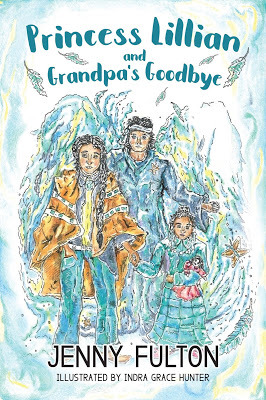
About the Book:
Princess Lillian and Grandpa’s Goodbye
Can two worlds exist at the same time?
Little Princess Lillian learns the spiritual world can interact with the physical. Imaginary is used to explain a reality, how heaven reaches down to earth as a young girl observes her grandpa awaiting his entrance into his eternal home.
How do you explain death and heaven to a child?
Led through a long hall in a hospital, Princess Lillian holds her mom's hand as an angel whispers comforting words.
Incorporating bits of Native American and Christian tradition, an intimate celebration of a loved one's passing occurs as a family says good-bye to a man eager to meet his best friend, the King Above All Nations.
Purchase the Book
Amazon Barnes and Noble
 About the Author
About the AuthorJenny Fulton is a wife, mother, children's book author, YA fantasy author, blogger, and freelance writer with a B.S. in Bible, a B.S. in elementary education, and an endorsement in K-12 ESL. After graduating from Grace University in 2007, Jenny worked as a teacher in a variety of cultural and educational settings, both abroad and in the United States. She is a storyteller, a follower of Christ, and a seeker of truth.
An enrolled member of the Navajo Nation, Jenny grew up hearing stories from her dad about the supernatural workings on the Navajo Reservation. Her days are now mostly spent raising her three young daughters (homeschooling two of them) and writing as much as time and opportunity allows.
Jenny is a member of American Christian Fiction Writers (ACFW), Faithwriters.com, and is an author with Capture Books.
Connect with Jenny:
Website: https://heart-soul-mind.org/
Facebook: www.facebook.com/JennyFultonWriter
Instagram: https://www.instagram.com/jennyannfulton/
Twitter: https://twitter.com/AuthorFulton
New American Standard Bible: 1995 Update (La Habra, CA: The Lockman Foundation, 1995), Ru 1:16.
New American Standard Bible: 1995 Update (La Habra, CA: The Lockman Foundation, 1995), Ac 10:44–45.
New American Standard Bible: 1995 Update (La Habra, CA: The Lockman Foundation, 1995), Ac 15:28–29.
April 15, 2021
Bent Tree Bride ~ an Epic Romance from America's Southern Frontier ~ Book Feature
I love, love, love frontier fiction! If there is a particular genre that best stands a chance of finding a lifelong home on my bookshelf, it's historical fiction set on the American frontier. So when I had the chance to get hold of Denise Weimer's brand new release, Bent Tree Bride, you can bet I grabbed it.
I was already familiar with the the hero in the story, Sam Hicks, as he was first introduced to readers in Denise's previous novel, The Witness Tree, but Bent Tree Bride is a stand-alone. Best of all, the book is an epic romance set in the south, in a region I'm much less familiar than I am with the great "up north", so I was prepared to learn about some rich history along the way.

The Story
Susanna Moore can’t get him out of her mind—the learned lieutenant who delivered the commission from Andrew Jackson making her father colonel of the Cherokee Regiment. But the next time she sees Lieutenant Sam Hicks, he’s leading a string of prisoners into a frontier fort, and he’s wearing the garb of a Cherokee scout rather than the suit of a white gentleman.
As both Susanna’s father and Sam’s commanding officer, Colonel Moore couldn’t have made his directive to stay away from his daughter clearer to Sam. He wants a better match for Susanna—like the stuffy doctor who escorted her to Creek Territory. Then a suspected spy forces Moore to rely on Sam for military intelligence and Susanna’s protection, making it impossible for either to guard their heart.
My Takeaway
From the first compelling moment in her father’s library, when Susanna Moore ducks away and finds herself nose to nose with the stoic Sam Hicks, through the upheaval of a wilderness war in which both are dragged to the brink of survival, readers will root for their forbidden love to find its way. While following their adventure, devotees of history will delight in the author’s attention to detail, whether it’s the scrubbing of a pot with a corncob, or the executing of military maneuvers by a Cherokee regiment. Denise Weimer’s Bent Tree Bride presents an epic segment of history wrapped in a romance not to be forgotten.
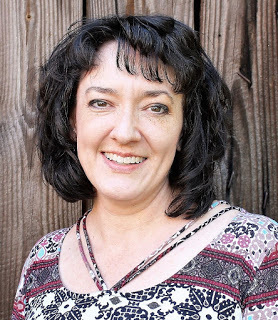
About the Author
Denise Weimer writes historical and contemporary romance and romantic suspense, mostly set in her home state of Georgia. She’s authored a dozen traditionally published novels and a number of novellas. As a managing editor for Lighthouse Publishing of the Carolinas, she also helps others reach their publishing dreams. A wife and mother of two daughters, Denise always pauses for coffee, chocolate, and old houses.
Connect with Denise here:
February 3, 2021
Book Review: To Dwell Among Cedars by Connilyn Cossette
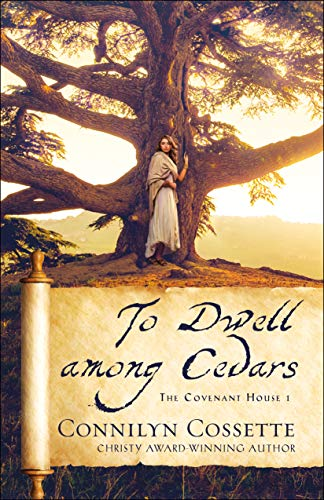
Connilyn Cossette has brought another Biblical saga to life in the pages of To Dwell Among Cedars , a story of the Ark of the Covenant and of God’s judgment, His mercy, and the redemption and forgiveness of those who feel beyond His reach. In it, she pens a stirring romance between vivid characters that come to life off the page and are not easily forgotten. (She gives them the most awesome names!) There were moments that moved a little bit slow in the earlier part of the book, but the unfolding drama and suspense heighten as the story reaches the turning point and beyond. A beautifully written novel I enjoyed very much.
February 1, 2021
When a History Lover says concerning Historical Fiction: “What’s the Point?”
I read that remark on a social media post recently. Someone was talking about writing historical fiction, and a history buff, ghosting the page, asked, “What’s the point?” as if there was no real value in reading fiction as an expression of history.
Of course, if you love historical fiction like I do, his comment rankles you as it did me. The implication that fiction has no value, no place in the world of studying history, seems both sad and blinded, doesn’t it?
I know that people love historical fiction for different reasons, but let me tell you why I love it.
When I was growing up, I thought I hated history. It was boring. It was names, dates, and events, all taught to me in a tangled up timeline that I could not make sense of. “History” seemed too vast and limitless for me to grasp. God created…and after that, things went in so many directions through such a spread of time that I couldn’t even fathom what was happening when and how these events all gelled together.
I graduated high school still thinking that I had no interest in history.
Then came historical fiction. Suddenly, by the deft pen of an able writer, a world opened to me. A world of history in context. A world where individuals moved through day-to-day lives, ate, slept, and loved. A world of people I cared about, even though they weren’t real—because the world around them was real. I began to understand the time periods and political upheavals representative of those eras. I started seeing what individuals who lived through them might have seen and I shared in their emotional experiences.
Without context, history meant nothing, and I could only learn little from it. But once it was peopled with individuals I cared about, it meant a great deal more.
Now to clarify, real people of history—the Ben Franklins and Marie Antoinettes, the peasants and kings, the scientists, explorers, missionaries, and poets, and all the other biographical individuals—I know they’re real. Yet even most biographies written about famous and infamous individuals lack the other important factor beyond what they did within their spatial context, and that’s how they behaved in an emotional context. Fiction allows us to see them (usually from the outside) but in an emotional context.
And that is specifically why I love historical fiction. While I understand that it is peopled with made-up individuals in pretend harrowing situations, it is also surrounded by the real, the ones who lived and walked among characters, the places and events that existed in which they had to survive. And that, my friends, has made me love history.
Why do you love historical fiction, or do you still not get it?
NOTE: This month is the last chance to sign up for my newsletter if you want to get in on next month's FREE READ, a novelette that is an expanded epilogue to Mist O'er the Voyageur and a prologue to my January 2022 release of the sequel Song for the Hunter.
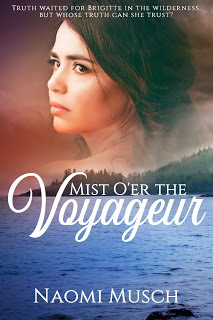

Sign up, and you'll receive The Long-Awaited Spring in my March issue of Northwoods Faith & Fiction, PLUS you won't have to wait to receive the free short story Lone River Woman.Sign up here: Northwoods Faith & Fiction
January 4, 2021
A cheerful heart is a good medicine (Prov. 17:22)
by Guest Author Carol McClain
The last chapter of 2020 closed a few days ago, but not without promising us more heartache in 2021. Our pandemic hasn’t finished with us, and we will find more grief and hardship for many more months.
Now, aren’t you glad you decided to read this blog piece?
But my prognostication comes with hope.
Find the humor.
The very act of smiling—even a fake smile—can change your mood. Go on and give it a try. We’re all in quarantine, so no one can see you grinning when you don’t want to (unless you have your Zoom video running. PLEASE, always remember, if your camera is on, colleagues can see what you’re wearing or not wearing).
For me, humor has been my mechanism for coping. A big zit on my nose? I don’t hide it with a burqa. I tell myself, “Own it, Carol. Make it work for you.” Or I ask for Ms. Pimple for rent. I recently read a cartoon that made me laugh. It is hilarious for this ex-pat New Yorker and the jab at the mighty Empire State’s governor.
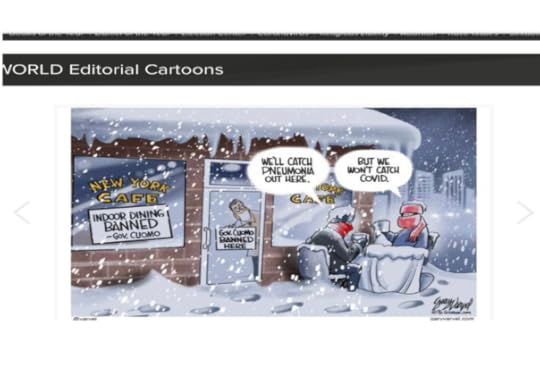 We can find laughter from the pandemic. And laughter is a good medicine. Not only did God tell us this. The Mayo Clinic confirmed it.
We can find laughter from the pandemic. And laughter is a good medicine. Not only did God tell us this. The Mayo Clinic confirmed it.According to the Mayo Clinic, laughter has the following benefits:
1. Cachinnation stimulates many organs.
2. Chuckling activates and relieves your stress response.
3. Mirth releases tension.
4. Hilarity improves your immune system (Take that, COVID-19!).
5. Got pain? Get snickering. Pain will flee (or escape my escapades in the thesaurus, or my poet’s penchant for alliteration).
6. Glee increases personal satisfaction.
7. And proving my initial point, guffawing improves your mood.
Don’t take my word for it. Check out the article.
If you don’t trust the Mayo Clinic, do a concordance check on your favorite version of Scripture.
So, here’s my shameless self-promotion. Skip this portion if you have no interest in considering my book (or you don’t mind breaking my heart). All my writing, even when dealing with intense subjects such as child slavery, drug addiction or loss, is always dosed with humor. People return to me time and again and speak how my book made them laugh (even after they cried).
This week, I’ve re-released an old book now called The Perils of Cheryl. It’s a LOL novel about divorce, dating, and the divine. One reader said her husband repeatedly asked her what was so funny as she snorted and chortled in bed reading the novel.
Once more: Don’t take my word for it. Check out The Perils of Cheryl
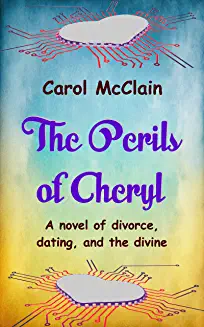
Also, don’t take my word about humor being biblical. Here’s another reference from Proverbs.
“She is clothed with strength and dignity; she can laugh at the days to come” (Pr. 31:25).
To find out more about Carol McClain visit: carolmcclain.com. Aside from laughing, signing up for my email makes me happy.
Happier still is the purchase of The Perils of Cheryl.
You can connect with McClain on Facebook at: facebook.com/author.Carol.McClain
On twitter and Instagram: @carol_mcclain
ABOUT THE AUTHOR
McClain is the award-winning author of four novels. The New York Yankee on Stinking Creek is the first-place winner of The Dragonfly Book Award for best novel.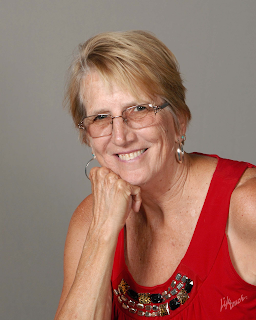 McClain writes novels about the redemption of the unredeemable. Even her most serious works are laced with humor. She is a consummate encourager, and no matter what your faith might look like, you will find compassion, humor and wisdom in her complexly layered, but ultimately readable work.
McClain writes novels about the redemption of the unredeemable. Even her most serious works are laced with humor. She is a consummate encourager, and no matter what your faith might look like, you will find compassion, humor and wisdom in her complexly layered, but ultimately readable work.
She is a past president of ACFW Knoxville and its current treasurer/secretary. She facilitates Postmark Writers, an offshoot of the LaFollette Art Group. She teaches online courses and is a clinical supervisor for WGU.
In addition to the above, she’s served on the Board of Connections to Recovery, an organization dedicated to keeping addicts sober. She’s mentored recovering addicts, and at one time, had been a foster mother–the complexity and difficulty of that calling proved she was better off writing about it than performing it.
(Is there nothing she can’t do?)
Aside from writing, she’s a skilled stained-glass artist, and a budding potter.
She lives in Tennessee with her husband, kitties, and Springer spaniel, and soon will own a passel of Nigerian Dwarf goats.
December 18, 2020
The Lady in Residence, by Allison Pittman -- Book Review
A spell-binding time slip novel that'll make you turn up the lights!
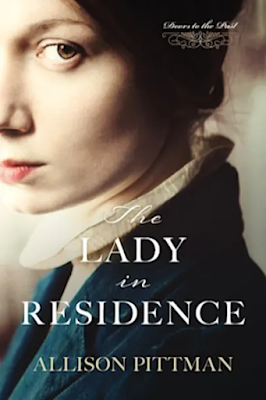 5 Stars
5 Stars
Meeting Dini Blackstone in the opening pages, I wasn't at first sure I'd like this heroine. but the aura is so completely enveloping right there, I was compelled to go on. Sure enough, true to form (because I've yet to be let down by one of Allison Pittman's stories) Dini soon grew on me. I think the fact that the author so winningly captures the mindset of a truly introverted person was part of it. It wasn't long before I was completely charmed by Dini the magician's individualism and bits of weirdness.
Then there's Hedda. What a 1920s goddess. I wasn't sure what to make of her either. We are given a deep look into her mind, and yet we can't decide if she's a looney or being gaslighted.
One thing is sure, Allison Pittman gaslights her readers along the way--in the most delightful sense. She doesn't make us think we're crazy, but she makes us wonder what to think until the very last page.
November 29, 2020
Love Books? Silly Question. You'll want to attend this Facebook Party.
Forty authors (yes, 40!) are hosting a Facebook event called the Wyoming Christmas Extravaganza. It's not really in Wyoming, but it truly is an extravaganza. The party lasts for three days! This sounds like a Biblical wedding feast. It's definitely a feast of books. We'll enjoy games and chit-chat, and every author during their time slot from December 3-5 (Thurs.-Sat.) is giving away items and books, so there'll be over a hundred chances to win. PLUS, there'll be a triple grand prize giveaway.
Readers...these are all paperbacks!
(There's a Fire Tablet and a $100 Amazon Gift Card up for drawing too!)

Besides all this, there'll be some freebies for everyone who attends.(We're talking some luscious book downloads. *Sigh*)
So head on over and join the Whispers in Wyoming group page here:https://www.facebook.com/groups/WhispersinWyomingRomance
THAT'S NOT ALL.You can enter for one of the grand prizes right now via this rafflecopter (or click on that image above):https://www.rafflecopter.com/rafl/display/822e967c10/
Make sure you don't miss it!

November 25, 2020
Launch Team Call-Out for Historical Fiction Lovers
Hey friends, I am expanding my launch team for my 2021 book release -- the sequel to Mist O'er the Voyageur. I've been calling it Song for the Hunter, but the official title is still to be determined. Want to join me on my team?
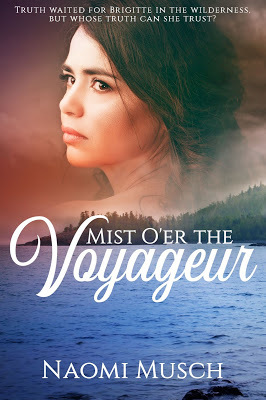
Here's what it means. You get a free, early read of the book in pdf format. I'll also send you some post cards and cover swag that you can use for yourself or pass on to your friends, your dentist, cousin Petunia, whoever you see.
Sounds great, right?
As we are a team in this, here's your part. You commit to post a review of the book when it releases, wherever you can. Amazon and the publisher's site; Bookbub and Goodreads if you use those, your blog if you have one, and anywhere else (such as in those busy Facebook reader groups or other social sites). You'd also be willing to mention the book from time to time where appropriate -- in those same reading groups, on your personal profile pages, with your circle of friends at church, to your local librarian (yes, please!).
If you've read Mist O'er the Voyageur, I hope you left a review. If you loved the book and would be thrilled to help me get the word out with the sequel, please let me know asap. Email me at naomimusch(at)naomimusch(dot)com.
Oh--and if you haven't read Mist, I hope you'll move it up your list. You can grab the e-book for only $2.99 on Amazon, and right now my publisher is having a big paperback sale on the LPC site. You can get it direct for 40% off plus free shipping (see the codes below). That offer is site-wide, so go do some Christmas shopping for your book lovers (or to sneak something into your own stocking).
Thanks, friends!
Buy from the publisher using a code below.


November 10, 2020
Book Review: Things We Didn't Say by Amy Lynn Green
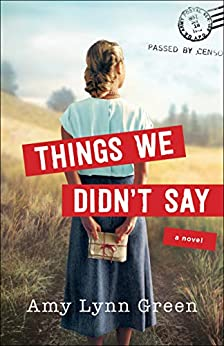
I’ve just become an Amy Green fan. Have you ever watched someone finger weave? Or knit? Or stitch together an intricately-designed quilt? I can’t do any of those things, and I’m enthralled by watching those who can. But I do write, and I’ve been studying WWII POW camps on the home front, and maybe that’s why I am so in awe of Amy Green’s first novel (according to the author’s note).
Using a very atypical story format, she has written what seems like a giant quilt pattern of relationships and story layers and laid each piece perfectly into place, seaming together a story rich with history, intrigue, and emotion. And like a finger-weaver, she kept hold of numerous threads at once and managed to snug each one tightly into place. She also resisted the urge to give away too much too soon, and I found myself trying to read between the lines of “things we didn’t say” to ferret out hints. All this combined it gave me a powerful reading experience.
The story itself, written through letters by various characters, all pointing to a charge of treason against the sharp-edged yet endearing protagonist, is a format that had to have been extremely challenging to write, especially since much of the correspondence overlaps in time and through distance during the second World War. I applaud her skill, and most of all, her attention to historic detail. I look forward to seeing what she writes next.
Do love the WWII era and other stories set on the home front?
The Love Coward takes place just after the war.
Finally, Burke is home and Tulla's dreams can proceed as planned...or can they?
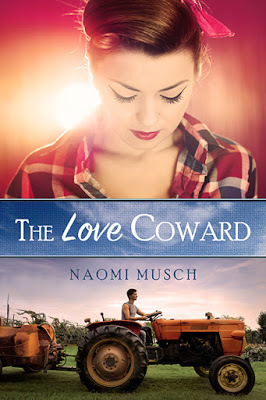
Available now in paperback and e-book.
October 20, 2020
I have exciting book news! (x3)
With the bizarreness of 2020, you could have blown me over when my agent called to tell me the news. In the months ahead, I'll share more about the story and the history along with some pictures of the setting (a favorite place). I will tell you now that the story takes place one year after the other book. In the meantime, if you haven't read Mist O'er the Voyageur , now would be a good time to move it up your queue.
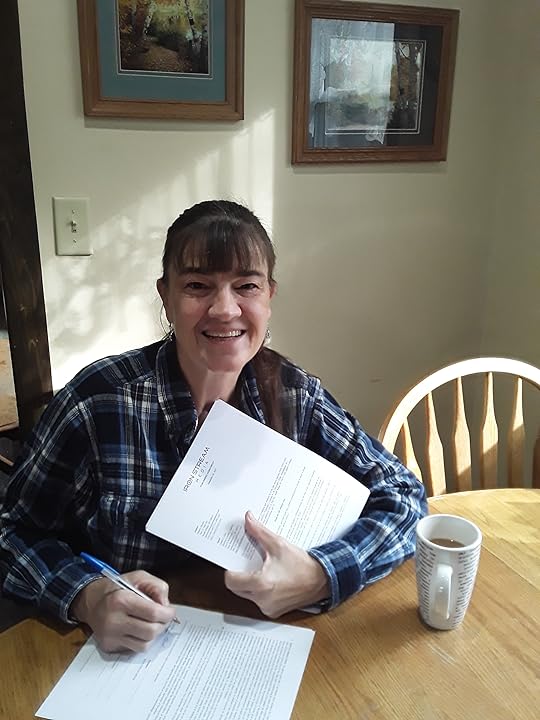
2.) As you know, I've been reissuing my back list of out-of-print books under the Long Lake Books banner, re-edited, revised, and updated of course. I hope you'll join me to welcome the newest of those older titles. THE LOVE COWARD releases on November 6, but you can pre-order the e-book here. YES, there will be a paperback too. It was a joy to revisit Tulla's story. If you like sweet historical romance with a Hallmark feel, I think you'll enjoy it.

WWII is finally over, and Tulla Johanson can hardly wait to move on and marry her long-time flame Burke Delgard. But when Burke backs out on their wedding day, and his best man Van finds her hiding her humiliation in his Hudson, it’s soon uncertain who'll turn out to be the bigger love coward? And what happens if all of them have a change of heart? READ MORE ABOUT IT HERE.
3) As for my final book news, I have a deal to share with you. October 8th remembered our nation's deadliest fire. Yes, it ran concurrent with the Chicago Fire, but Peshtigo's fire was farther north, consuming over 1,200,000 acres in northeast Wisconsin. News of what was happening up north was slow in reaching the governor, so many resources had already been rushed to aid Chicago. Sadly, the Great Peshtigo fire left an estimated 1500-2500 people dead. The reason for the wide calculations in mortality was because of the unknown number of people spread throughout the "sugar bush" country, including those at the logging camps, farmers, railroad crew workers, indigenous communities, and so on. To commemorate that historic event, my novelized story of the Peshtigo Fire is on sale for 99 cents today through Friday, October 24th. Five days only. Get it here.
Sometimes people ask if I have a favorite book baby. I couldn't choose a favorite any more than I could choose a favorite child, but the characters in The Red Fury are definitely near and dear to my heart.

About the Book:Peshtigo, Wisconsin ~ 1870Spurned twice since the death of her first love in a logging accident, Lainey Kade has become the object of talk. "That Lainey, she's a shrew all right. Not ever going to marry, likely," the gossips say. Fleeing heartache and flaunting convention, Lainey seeks solace instead in seeking adventure and breaking the rules.
Embarking on a journey, where she hopes to put the past behind, Lainey crosses paths with brothers Zane and Kelly Beaumont and pretends to be a married woman. It isn't long, however, before they find her out. She soon forges an adventurous companionship with these men whose nightmares since the Civil War have never let them return home.
Following the lead of the next thrill, the ties of their friendship tighten, and Lainey denies love's rekindling spark. But, as fires rage across the Wisconsin wilderness and a dry summer turns deadly, the brothers' attraction to her may tear them each apart, and Lainey may be consumed by the fury burning inside her.Check out the entire Empire in Pine series here.
Thanks for Reading!During the course of the coming months, I'll be looking for some avid readers and reviewers to join my launch team. If you're interested in helping to get the word out about Song for the Hunter or any of my other books, please give me a shout out at muschfarm(at)yahoo.com or on social media. Thank you!
NEW Discussion Guide
- Naomi Dawn Musch's profile
- 456 followers



